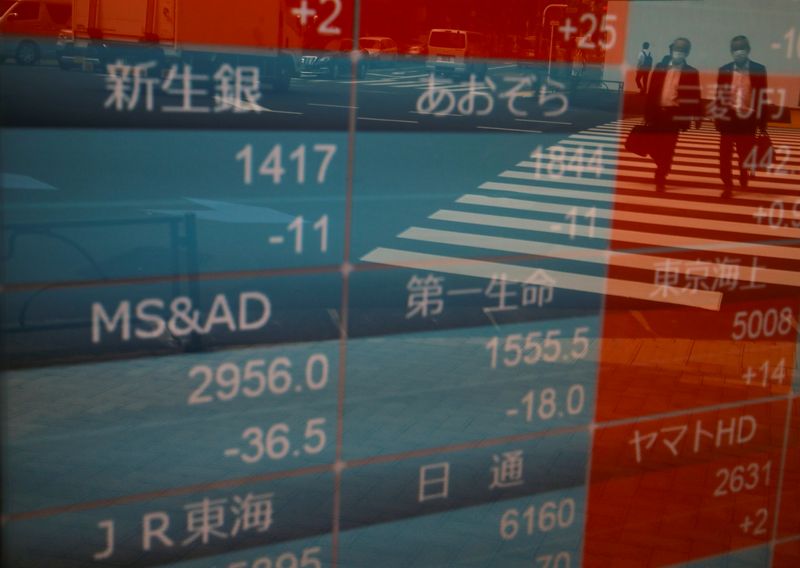By Hideyuki Sano and Chibuike Oguh
TOKYO/NEW YORK (Reuters) - Global shares stepped back on Wednesday as soft U.S. retail sales fuelled worries that rising coronavirus cases could stifle a still fragile economic recovery, dampening the euphoria from vaccine trial breakthroughs.
U.S. S&P500 futures (ESc1) shed 0.3% in Asian trade on Wednesday, a day after S&P500 index lost 0.48%, while Europe's Euro Stoxx 50 futures (STXEc1) eased 0.2%.
Japan's Nikkei (N225) dropped 0.76%, while MSCI's broadest index of Asia-Pacific shares outside Japan (MIAPJ0000PUS) was little changed, drawing support from better handling of the pandemic in much of the region.
"Given the rapid gains over the last 10 days or so, a correction was inevitable," said Hirokazu Kabeya, chief global strategist at Daiwa Securities.
Global stocks, measured by MSCI's broadest gauge of world equities (MIWD00000PUS), have risen more than 11% so far this month.
The retail sales report released by the U.S. Commerce Department showed spending decelerating as the holiday shopping season approaches, amid a lack of fresh fiscal relief from Washington.
A skittish mood also swept investors as several U.S. states began restricting gatherings and mandating face-coverings after more than 70,000 Americans were hospitalized for treatment of COVID-19 as of Monday, according to a Reuters tally of public health figures.
The surge in new coronavirus cases comes as investors have hailed two promising vaccine trial results published earlier this month.
"We're are coming out of a solid two weeks so the market being down half a percent isn't that bad with the prospect of COVID lockdowns," said Jamie Cox, Managing Partner for Harris Financial Group.
U.S. Federal Reserve Chairman Jerome Powell noted the current surge in coronavirus cases is a big concern, and the economy will continue to need both fiscal and monetary policy support.
"The soft U.S. retail data is showing the impact of dwindling fiscal support. But the inconvenient truth is that governments no longer have lots of money to spend like they did earlier this year," said a trader at a major Japanese bank.
"That means investors will expect the Fed to do more and the U.S. yield curve will flatten."
Bond yields have come down with the 10-year U.S. Treasuries dropping to 0.851% (US10YT=RR), its lowest level since Nov. 9 and off 7 1/2-month high of 0.975% touched last week.
Falling U.S. yields put pressure on the U.S. dollar, against the yen in particular.
The dollar fell to 104.18 yen
The euro moved little at $1.1864 (EUR=) while the Chinese yuan hit a 2 1/2-year high of 6.5455 per dollar in the offshore trade
Sterling held firm after UK tabloid the Sun reported that Britain could reach a post-Brexit trade agreement with the European Union by early next week.
The pound changed hands at $1.3252
Oil prices eased on a bigger-than-expected build in U.S. crude stockpiles, though hopes that OPEC and its allies will postpone a planned January increase to oil output braked losses.
Brent crude futures (LCOc1) fell 0.35% to $43.60 per barrel (LCOc1).
